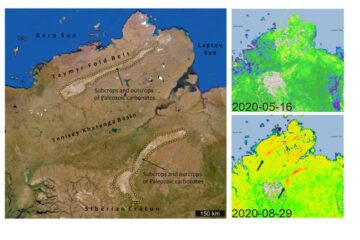Earth Sciences (also referred to as Geosciences), which deals with basic issues surrounding our planet, plays a vital role in the area of energy and raw materials supply.
Earth Sciences comprises subjects such as geology, geography, geological informatics, paleontology, mineralogy, petrography, crystallography, geophysics, geodesy, glaciology, cartography, photogrammetry, meteorology and seismology, early-warning systems, earthquake research and polar research.

Significant earthquakes, from gentle shaking to devastating tremors, are hazards caused by a sudden release of stress that has built up in geological faults. More subtle events called slow slips…

In a study led by the University of Bonn, geologists compared the spatial and temporal distribution of methane concentrations in the air of northern Siberia with geological maps. The result:…

The rise and fall of sea levels influence the likelihood of volcanic eruptions on the Greek island of Santorini, new research led by Oxford Brookes University has discovered. Analysing the…

Surrounding land reacts to fluctuations in the water level. The Dead Sea is shrinking. There are many reasons for this: climate change is a contributing factor, as is human overuse…

Seismic waves passing through the ground near Longyearbyen in the Adventdalen valley, Svalbard, Norway have been slowing down steadily over the past three years, most likely due to permafrost warming…

Supervolcano fed from Earth’s mantle caused crustal plates to rotate. The plates of the Earth’s crust perform complicated movements that can be attributed to quite simple mechanisms. That is the…